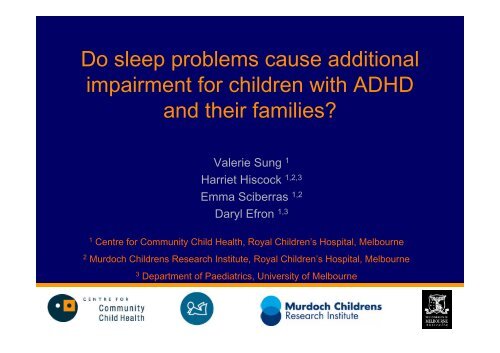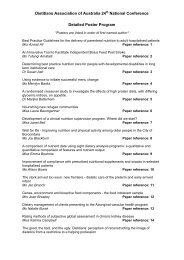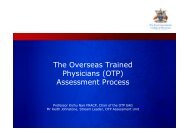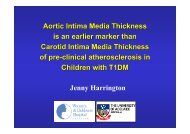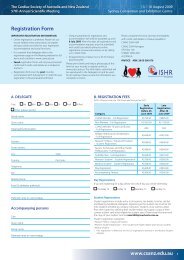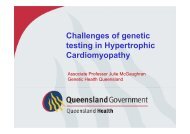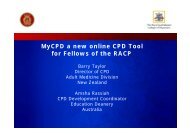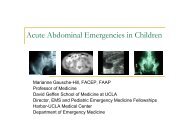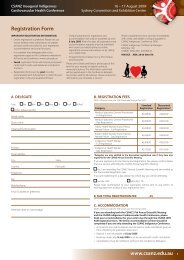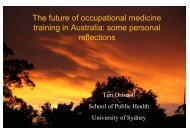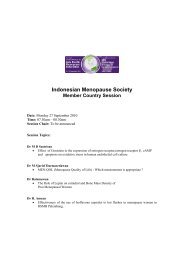Do sleep problems cause additional impairment for children with ...
Do sleep problems cause additional impairment for children with ...
Do sleep problems cause additional impairment for children with ...
- No tags were found...
You also want an ePaper? Increase the reach of your titles
YUMPU automatically turns print PDFs into web optimized ePapers that Google loves.
<strong>Do</strong> <strong>sleep</strong> <strong>problems</strong> <strong>cause</strong> <strong>additional</strong><strong>impairment</strong> <strong>for</strong> <strong>children</strong> <strong>with</strong> ADHDand their families?Valerie Sung 1Harriet Hiscock 1,2,3Emma Sciberras 1,2Daryl Efron 1,31Centre <strong>for</strong> Community Child Health, Royal Children’s Hospital, Melbourne2Murdoch Childrens Research Institute, Royal Children’s Hospital, Melbourne3Department of Paediatrics, University of Melbourne
ADHD• most common childhood mental healthdisorder– affects up to 11% of Australian school<strong>children</strong> 1• extremely high burden to families1Sawyer et al 2001
Sleep <strong>problems</strong> and ADHD• Reported by up to 50% of parents 2• difficulties initiating & maintaining <strong>sleep</strong>•nightmares• tiredness upon waking• snoring, restless legs syndrome, periodic limbmovement disorder2Owens 2005
Impact of ADHD alone• Compared to <strong>children</strong> <strong>with</strong>out ADHD,those <strong>with</strong> ADHD have– greater difficulties in behavioural, social & schoolfunctioning– poorer quality of life– mothers who report more symptoms of depression– families who experience more adverse impacts onfamily activities
Impact of <strong>sleep</strong> alone• Compared to <strong>children</strong> <strong>with</strong>out <strong>sleep</strong> <strong>problems</strong>,those <strong>with</strong> <strong>sleep</strong> <strong>problems</strong> have poorer:– behavioural– emotional– social– cognitive outcomessimilar to <strong>problems</strong> experienced by <strong>children</strong> <strong>with</strong>ADHD
Impact of <strong>sleep</strong> <strong>problems</strong> in <strong>children</strong> <strong>with</strong> ADHDWe don’t know:– the <strong>additional</strong> impact of <strong>sleep</strong> <strong>problems</strong>, in<strong>children</strong> <strong>with</strong> ADHD, on• child day-to-day functioning• primary caregiver mental health• family quality of life– whether, how often, & how effectivelypaediatricians identify / manage <strong>sleep</strong> <strong>problems</strong>in <strong>children</strong> <strong>with</strong> ADHD
Aims• To determine, in a sample of school<strong>children</strong> <strong>with</strong>clinician-diagnosed ADHD:A) prevalence and types of child <strong>sleep</strong> <strong>problems</strong>B) associations of child <strong>sleep</strong> <strong>problems</strong> <strong>with</strong>• child» quality of life» daily functioning» school attendance• caregiver» mental health» work attendance• family quality of lifeC) paediatricians’ management of <strong>sleep</strong> <strong>problems</strong>
• Cross-sectional surveyMethods• Sample– primary caregivers of Victorian school<strong>children</strong> <strong>with</strong> cliniciandiagnosedADHD, aged 5 to 18 years• Exclusion– families <strong>with</strong> insufficient English• Recruitment (May to November 2006)– outpatient clinics at CCCH, RCH– 7 private paediatricians in Melbourne– Victorian ADHD support groups
Primary outcome measure: <strong>sleep</strong>• Primary caregiver report of <strong>sleep</strong> problem– none– mild– moderate / severe• Problematic <strong>sleep</strong> patterns:– difficulty falling a<strong>sleep</strong>– resisting going to bed– tossing / turning in bed– snoring / difficulty breathing– waking up frequently during the night– difficulty getting up in the morning– tiredness upon waking
Secondary outcome measures• Child outcomes– Child health-related quality of life (HRQoL)• Pediatric Quality of Life Inventory (PedsQL 4.0)– Child daily functioning• Daily Parent Rating of Evening and Morning Behaviour scale(DREMB)– higher score indicates worse functioning– School attendance• number of days missed / late <strong>for</strong> school over previous 6 months
Secondary outcome measures• Caregiver outcomes– primary caregiver mental health• Depression Anxiety Stress Scale (DASS)– primary caregiver & partner work attendances• number of days missed / late to work over previous 6 months• Family outcomes– family quality of life• Child Health Questionnaire (CHQ)– Emotional Impact, Time Impact, Family Activities subscales• Paediatrician identification of <strong>sleep</strong> <strong>problems</strong>– asked about?– advice given?– helpful?
Analysis• Prevalence– no, mild, moderate / severe <strong>sleep</strong> <strong>problems</strong>• Comparison– no <strong>sleep</strong> problem vs - mild <strong>sleep</strong> problem- moderate / severe <strong>sleep</strong> problem• Linear regression <strong>for</strong> continuous outcome variables– PedsQL, DREMB, CHQ• Logistic regression <strong>for</strong> categorical outcome variables– primary caregiver mental health (DASS)
Confounders• Regressions adjusted <strong>for</strong> potential confounders:– child age and gender– presence of comorbidities (yes / no)– medication use (yes / no)– severity of ADHD symptoms• DSM IV Rating Scale– primary caregiver educational status• less than high school• high school only• more than high school
330eligible familiesResults251contactableby phone79not contactableby phone9 declinedparticipation45did not returnsurveys37did not returnsurveys197returnedsurveys42returnedsurveys= 239 returned surveysResponse Rate 74%
Results - DemographicsChildAge (mean) 12 (range 5.5 – 18.5)Male 90%Medication use 86%Comorbidities (≥ 1) 70%Primary caregiverAge (mean) 43 (range 25.5 – 73)Mother 87%Employed 68%Education statusDid not complete high school 39%Completed high school only 14%Completed tertiary/postgraduate degree 47%FamilyTwo caregiver household 77%
Results – Sleep <strong>problems</strong> & patternsmild<strong>sleep</strong> <strong>problems</strong>moderate / severe<strong>sleep</strong> <strong>problems</strong>n = 68 (29%) n = 107 (45%)Sleep patterns % %Difficulty falling a<strong>sleep</strong> 71 84Resisting going to bed 44 68Tiredness upon waking 43 62Difficulty getting up in the morning 35 56Tossing / turning in bed 27 49Waking up frequently during the night 25 36Snoring / breathing difficulty 9 11
Results – Sleep problem identification• Paediatrician identification of <strong>sleep</strong> <strong>problems</strong>– 45% of caregivers reported paediatrician askedabout child’s <strong>sleep</strong>• 60% reported receiving advice• 68% rated advice helpful
Results – Child Outcomesnomild**moderate / severe**<strong>sleep</strong> problem<strong>sleep</strong> problem<strong>sleep</strong> problemPeds QLTotal score6962*58*Physical summary787269Psychosocialsummary6659*54*Daily FunctioningDREMB score1519*23**p < .01** adjusted <strong>for</strong> child age / gender, presence of comorbidities, medication use,severity of ADHD symptoms, primary caregiver educational status
Results – Caregiver & Family Outcomesnomild**moderate / severe**<strong>sleep</strong> problem<strong>sleep</strong> problem<strong>sleep</strong> problemCaregiver mentalhealth problem(% (OR))3453 (2.0)62 (2.7)*CHQEmotional impact433832Time impact635147Family activities575142** adjusted <strong>for</strong> child age / gender, presence of comorbidities, medication use,*p = .01severity of ADHD symptoms, primary caregiver educational status
Results – School & work attendancesno <strong>sleep</strong> mild moderate / severe<strong>sleep</strong> problem <strong>sleep</strong> problem <strong>sleep</strong> problemn = 64 n = 68 n = 107% % %Childmissed school 58 75 * 79 *late <strong>for</strong> school 34 35 54 *Primary caregivermissed work 26 26 28late <strong>for</strong> work 24 26 37Partnermissed work 7 6 14late <strong>for</strong> work 5 18 * 20 **p < .05
Study limitations• Diagnosis of ADHD made by a clinician, not a <strong>for</strong>maldiagnostic interview• Cross-sectional study– causality cannot be inferred• Sleep measures based on subjective caregiver report
Summary• Sleep <strong>problems</strong> in school<strong>children</strong> <strong>with</strong> ADHD– very common– associated <strong>with</strong> poorer•child• caregiver• family» quality of life» daily functioning» school attendance» mental health» work attendance» quality of life
Summary• Further research– RCT to determine whether implementation of a <strong>sleep</strong>intervention in <strong>children</strong> <strong>with</strong> ADHD can• improve outcomes over and above treatment of ADHD alone• reduce need <strong>for</strong> medication in some ADHD <strong>children</strong>– longitudinal data to determine direction of therelationship between ADHD and <strong>sleep</strong> <strong>problems</strong>
Acknowledgements• Co-authors– Dr Harriet Hiscock– Emma Sciberras– Dr Daryl Efron• CCCH staff– Fi Ferlin– Wendy Foster– Renee Jean– Raelene McNaughton– Rachel McConaghy• Paediatricians– Dr Chitra Chandran– Dr Katie Heathershaw– Dr Rick Jarman– Dr Lionel Lubitz– Dr Annie Moulden– Dr Anita Murphy– Dr Carl Orkin– Dr Anne Turner• MCRI staff– Anne Hampton– Anna Price


